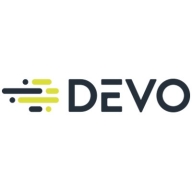
![i-SIEM [EOL] Logo](https://images.peerspot.com/image/upload/c_scale,dpr_3.0,f_auto,q_100,w_64/lm2hfus1tm88hmfj6huefb8r1sfh.jpg?_a=BACAGSDL)
Devo and i-SIEM [EOL] compete in the SIEM market. Devo has an edge in deployment simplicity and customer satisfaction, while i-SIEM [EOL] stands out with its feature set despite higher costs.
Features: Devo provides robust analytics, real-time data processing, and enhances security management. i-SIEM [EOL] provides advanced threat detection, compliance reporting, and detailed compliance oversight.
Ease of Deployment and Customer Service: Devo offers straightforward deployment and excellent support for smooth integration. i-SIEM [EOL] requires additional resources for a more complex deployment but has diligent problem-solving customer service.
Pricing and ROI: Devo is cost-effective with a favorable ROI due to lower setup costs. i-SIEM [EOL] has higher initial costs but offers extensive features and long-term returns for detailed security operations.

| Company Size | Count |
|---|---|
| Small Business | 8 |
| Midsize Enterprise | 4 |
| Large Enterprise | 11 |
Devo is the only cloud-native logging and security analytics platform that releases the full potential of all your data to empower bold, confident action when it matters most. Only the Devo platform delivers the powerful combination of real-time visibility, high-performance analytics, scalability, multitenancy, and low TCO crucial for monitoring and securing business operations as enterprises accelerate their shift to the cloud.
i-SIEM [EOL] is an innovative security information and event management platform designed to enhance threat detection and response capabilities in IT environments.
i-SIEM [EOL] offers a comprehensive approach to managing and analyzing security alerts, ensuring that businesses can effectively mitigate risks. With advanced threat intelligence and robust analytics, it helps organizations streamline their security operations and improve incident response times, providing each organization the information required to make informed security decisions.
What are the most important features of i-SIEM [EOL]?i-SIEM [EOL] is particularly beneficial in industries such as finance and healthcare where data security is paramount. Its ability to integrate with existing infrastructure allows seamless adoption, offering enhanced security without disrupting operations. Industries handling sensitive information value its advanced capabilities to safeguard data integrity.
We monitor all Security Information and Event Management (SIEM) reviews to prevent fraudulent reviews and keep review quality high. We do not post reviews by company employees or direct competitors. We validate each review for authenticity via cross-reference with LinkedIn, and personal follow-up with the reviewer when necessary.